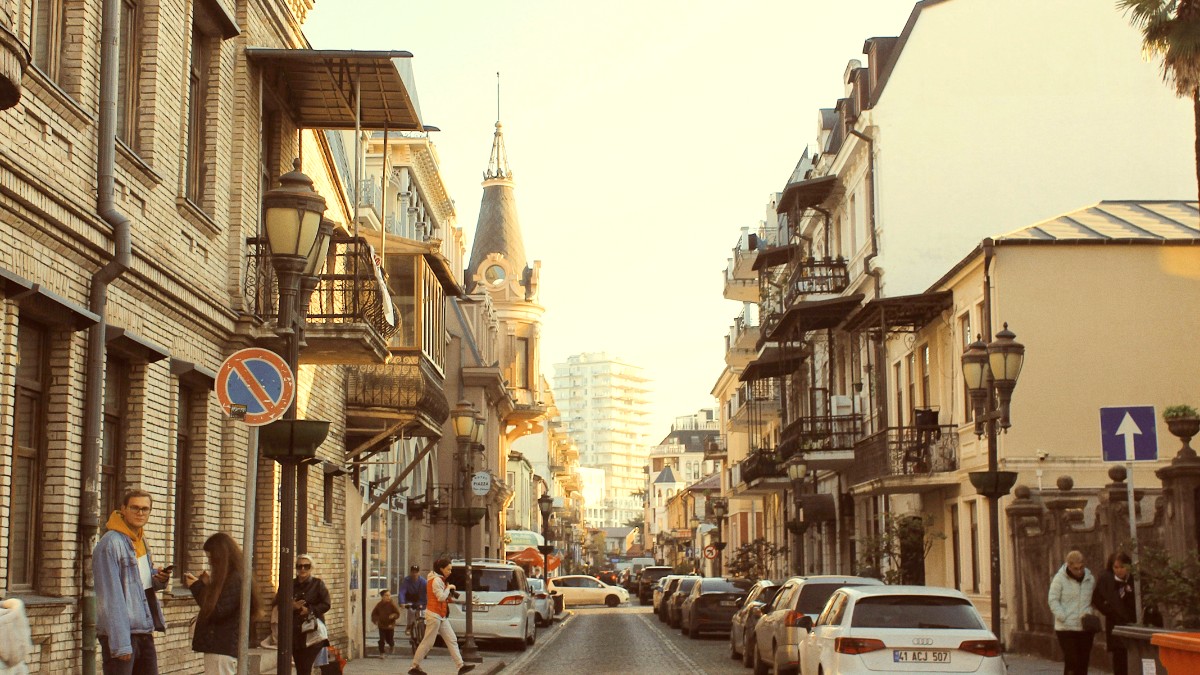
Adjara, Georgia
Georgian cuisine is known for its hearty, often shareable dishes, reflecting a culture of generosity and communal dining. Its flavors combine influences from the Middle East, Mediterranean, and Black Sea regions, resulting in a distinct taste profile.
Walnuts, garlic, fresh herbs (coriander, parsley, dill, tarragon), and various cheeses like Suluguni and Imeruli are fundamental. Pork, beef, and chicken are common meats. Tomatoes, cucumbers, eggplants feature prominently. Spices include blue fenugreek and marigold petals.
The iconic boat-shaped bread filled with cheese, topped with a raw egg and a pat of butter, stirred in at the table to create a rich, creamy filling. This is the region's culinary signature.
A rich, comforting dish unique to Adjara, made from melted butter and cheese, often served with mchadi (cornbread).
Due to its coastal location, Batumi features fresh Black Sea fish and seafood, often grilled or pan-fried.
This is the ultimate must-try. A boat-shaped bread, generously filled with a blend of cheeses, then baked. A raw egg yolk and a pat of butter are added to the hot cheese just before serving. Stir them in at the table until creamy.
Found everywhere, from specialized "khachapuri houses" to general Georgian restaurants.
Georgian dumplings, typically filled with spiced meat (a mix of pork and beef is common) and a savory broth inside. Also available with cheese, mushrooms, or potato.
Hold the knot, bite a small hole, slurp the broth, then eat the rest, leaving the knot.
Vegetarian appetizers made from various finely chopped and ground vegetables (spinach, beetroot, cabbage, beans) mixed with walnut paste, garlic, and herbs.
Often shaped into small balls and garnished with pomegranate seeds.
Often called "Georgian Snickers." A traditional candle-shaped candy made by repeatedly dipping strings of nuts (walnuts, hazelnuts) into thickened grape juice, then dried. It is chewy and sweet.
Gozinaki: Traditional caramelized walnut brittle, popular during New Year. Pelamushi: A sweet, thick porridge made from grape juice and corn flour, often served with nuts.
For a refined culinary experience, Batumi has upscale restaurants combining traditional Georgian flavors with modern techniques, often with elegant settings and sea views.
These establishments offer a comfortable dining experience with a wide selection of Georgian dishes at reasonable prices. They often feature a lively atmosphere and sometimes live music.
For travelers on a tighter budget or those seeking quick, authentic bites, numerous options exist throughout the city.
A bustling, sensory-rich market where you find fresh local produce, a vast array of spices, various Georgian cheeses (like suluguni), freshly baked bread, and local sweets like churchkhela. An immersive experience and a great place to pick up ingredients for a self-catered meal or picnic.
Offers a glimpse into local daily life and traditional Georgian goods.
A specialized market where you purchase fresh Black Sea catch. Many small restaurants nearby cook your freshly bought fish for a small fee, offering an unique and delicious "catch of the day" experience.
A local tradition not to be missed for seafood enthusiasts.
Batumi's growing popularity brings a rise in international dining options, including Turkish, Ukrainian, Italian (pizzerias), Asian (sushi, Chinese), and European dishes.
Support local artisans and small businesses directly at markets and independent shops. This helps money directly benefit the local economy and traditional crafts.
Be mindful of animal products; ensure they are sourced ethically if you choose to purchase them.
If purchasing significant quantities of goods, be aware of your home country's customs regulations regarding imports.
Clearly communicate your allergies. A translated allergy card in Georgian helps avoid misunderstandings, especially in smaller, local eateries where English might be limited.
Walnuts are a very common ingredient in Georgian cuisine (satsivi, pkhali, sauces). Ask if dishes contain nuts.
Translation apps like Google Translate (with Georgian language pack for offline use) are invaluable for communicating dietary needs. Online forums and expat groups also offer updated recommendations.
For severe allergies, staying in an apartment with kitchen facilities and preparing your own meals from market ingredients offers the most control.
Bread is central to the Georgian diet, making strictly gluten-free dining challenging. Cornmeal (mchadi) serves as a common substitute for wheat bread.
For severe allergies or very specific dietary needs, staying in an apartment with kitchen facilities and preparing your own meals from market ingredients offers the most control.
Many traditional Georgian restaurants, especially in the evenings, feature live performances of polyphonic singing and energetic folk dances.
A unique Batumi experience involves visiting the Fish Market, selecting fresh seafood, and then taking it to one of the nearby small restaurants that cook it for a small fee.
While not formally structured within Batumi city, staying in a guesthouse often provides a similar informal homestay experience, offering direct interaction with local hosts.
A prominent venue that hosts a variety of plays and theatrical performances, often in Georgian. Check their schedule for current shows during your visit.
Offers a traditional theatrical experience.
Home to the Batumi Opera and Ballet Theatre and various concert halls. It stages classical music concerts, opera, and ballet performances throughout the year.
Consult their schedule for upcoming events for a formal cultural experience.
Hotel concierges often have updated information on special exhibits, concerts, or local festivals that might coincide with your visit.
Check online event listings before or upon arrival for any special cultural programming. This ensures you experience unique events.
The Batumi Tourist Information Center is a great resource for up-to-date information on cultural events, workshops, and guided tours.
Georgian cuisine provides a rich exploration of tastes and traditions. From street food to fine dining, a diverse range of options is available.